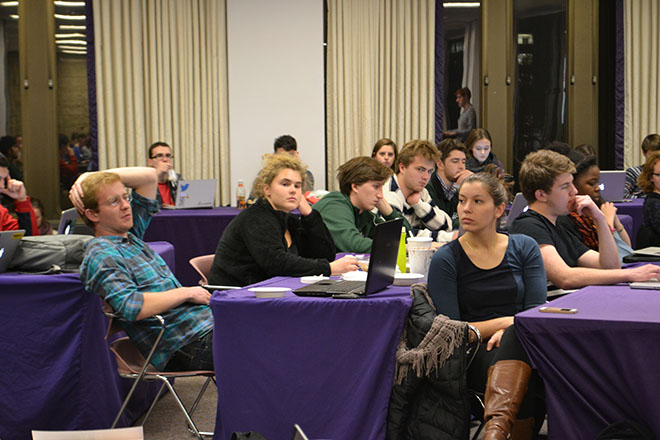
Students introduced a resolution to ASG on Wednesday night, declaring support for increased University response to the Ebola crisis. The resolution called for a response to the national emphasis placed on acquiring more medical aid, professionals and treatment to those areas in Africa where over 14,000 cases of Ebola have been confirmed. With the death toll from the disease crossing the 5,000 mark on Nov. 12, there is a heightened sense of urgency for greater international aid.
Motive for the resolution came from the acknowledgement that universities have remained silent regarding the issues of response to the Ebola crisis. Universities across the nation have enacted minimal initiatives for the Ebola crisis in comparison to other infectious disease outbreaks in the past, such as AIDS and Tuberculosis. The Feinberg School of Medicine is looking to kick-off this movement here at Northwestern, as well as other universities throughout the nation, where previous support for those traveling abroad has been discouraged.
"The general vibe from Feinberg is that they don’t want people to go, which I think is really hypocritical given the values," said Weinberg senior Michael Miller, author of the resolution. "This resolution will ideally encourage those who are on the fence about going."
Main points of the resolution include ensuring that physicians who choose to go abroad are not subjected to financial barriers, that their safety is maximized and that there is adequate coverage and substitutes to take care of their patients here in Chicago. Work within departments will be done to secure coverage for those who choose to take leave.
"It makes a strong statement of institutional values for the university to encourage people to go abroad," Miller said. When looking for ways to kick off the support effort of universities throughout the nation, Miller added, "We sat down and realized the Northwestern would be a really good place to do this because of the really strong justice culture and many students talk about global engagement."
"What better way to engage with global partnerships than to be involved first-hand using our resources to help out in a global health crisis,” said Medill senior and Co-Director of The Global Engagement Summit Joey Lautrup.
Additional business of the meeting included addressing the student resource Wildcat Connection and the improvements that can be made to facilitate use of the student organization database. Further ideas brought up in the meeting emphasized methods of integration with other forms of social media, more centralization and personalization and the addition of a mobile version of Wildcat Connection, in the effort to make the resource more user-friendly.
Many agreed upon the necessity to keep the site updated more frequently and promote the tool to incoming freshmen. “Perhaps more collaboration with groups during Wildcat Welcome and making sure that freshmen are aware,” said Serene Darwish, vice president for student activities.
In addition, a Student Group Spotlight focused on Northwestern’s sub-national chapter for Quest Scholars, QSN. President Amanda Walsh highlighted many of the programs and goals of Northwestern’s only low-income student advocacy group.
“Essentially what we really want to do is create a community for our low-income students on campus and advocate for them as well,” Walsh said.
Whether it’s financial or social burdens, “we want to make sure that those barriers are not in effect when they try to become engaged in the community,” added Walsh.
Last year, QSN held events such as Money Matters week, the first socioeconomic discussion established at Northwestern, as well as Questgiving dinner, a dinner free of charge held for students who stayed on campus during Thanksgiving break, regardless of socioeconomic status or if they were members of QSN. “We don’t want to be an exclusive organization on campus,” Walsh said.